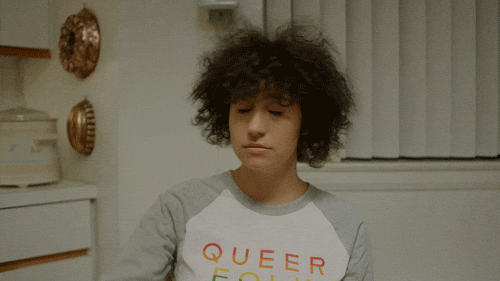8 ways technology is probably screwing your sex life

If you exist on this planet today, you likely know all about trying to talk to someone who’s distracted by their smartphone, and/or maybe that someone is you. While we can hum and haw about the possible life-altering benefits vs. the life-altering downsides of technology (especially those of us who remember life without the internet), one thing’s for sure: the exponential rise of said technology is taking its toll on intimacy and sex. One survey found 28% of people spend less time with “meatspace” friends (I’m appalled at the term meatspace, but there you go) in favor of online activity, and almost 20% say they’re having less sex.
Globally respected sex therapist Ruth Westheimer (AKA Dr. Ruth) recently announced that our obsession with technology in general—and the smartphone in particular—is ruining our sex lives. Dr. Ruth gained fame and notoriety in the 80s for her frank discussions as a celebrity sex therapist.
"Everybody is lonely, watching a screen and getting addicted to it, because they think, 'Who knows what's going to happen on that screen that I'm missing,'" Westheimer, now 90, told The Current's Anna Maria Tremonti. "They don't have a free thought to get sexually aroused, to make time for sex … we lose looking at each other.”
Not convinced your smartphone/laptop/whatever is stacking the sex and love odds against you?

Here are 8 ways tech may be screwing you (not in a good way):
1. Intimacy diluted
Paul Levy for The Daily Mail asserts “the more we resort to digital intimacy, the less fluent our actual intimacy becomes.” According to the Pew Research Centre, 25% of cell phone owners in a marriage or partnership have felt their spouse or partner was distracted by their cell phone when they were together. Levy points out that as “the quality of our physical connections gets diluted over time, we adjust, expecting less. We forget what real romance is.” The fact is, although we all need deep in-person communication, many of us aren’t getting it. Levy has coined the term ‘wretched contentment’ for the act of spending a night watching TV and constantly checking phones without ever talking. It may feel short-term pleasant, but it ain’t satisfying.
2. Communication compromised
How easy is it to express unbridled joy, profound sorrow, or any number of other apparently deep emotions—with your device? I mean, all you gotta do is click “like,” right? But just as a “like” can’t replace actually celebrating with someone, a frowning or crying emoji can’t replace sharing in someone’s grief or rage IRL. In the same way, typing an ‘X’ at the end of your text messages can’t replace actual kisses. Seems obvious? But people seem to forget this. And while lack of intimate in-person communication is a problem in many relationships, communicating too much via digital can screw you too. A survey of 24,000 married people found that using 5+ channels to communicate with their partner was connected to decreased relationship satisfaction. Of course, it’s likely that not enough offline and too much online communication go hand in hand.

3. Fighting facilitated
Fact: people easily get into arguments via text in ways they never would in person. Misunderstandings are very easy when you can’t see a person’s nonverbal cues (body language), y’all. Especially considering a lot of people aren’t skilled writers capable of properly rendering emotion. Zach Brittle for The Washington Post describes how, as a therapist, he is seeing a rise in couples who do things via text that many wouldn’t dream of—like ask for a divorce.
4. Jealousy provoked
Maybe you’ve wondered who is messaging your beloved so damn often. Maybe you start to suspect, or even resent. A University of Missouri study interviewed hundreds of Facebook users between 18 and 82 who believed their partner’s Facebook use increased their relationship conflict. The study found that as the use of FB increased, so too did their jealousy—leading to break-ups, cheating, and divorce. Brittle cites a married couple who came in because the husband was having a cyberaffair. Scoffable? Maybe, but one survey found 77% of people consider cybersex cheating as cheating nonetheless. Believe it or not, cybercheating was responsible for a third of divorce cases in 2009. And since almost 90% of us admit to “stalking” the social networking activity of our exes, and 60% of us admit to “stalking” crushes, it’s not hard to imagine how online emotions can end up constituting a betrayal.

5. Porn proliferated
Mainstream porn has beyond proliferated our online universes—that’s hardly news. And since much of it is still catered almost exclusively to men, many women are reporting that they can’t compete with the women on camera, and that their partners neglect them in favor of porn. Maybe if more couples watched the equal-pleasure sex on Bellesa together, the world would be a sexier place. Just sayin.
6. Disappointment fueled
Oxford University analyzed the impact of social networking sites on marital satisfaction. They followed almost 24,000 married couples in Europe very closely and found "The more couples read about others' exciting lives on social media, the more likely they were to view their own with disappointment and disdain.” Depressing much? And if you think it’s just millennials, Brittle dashes that, describing a couple in their 60s with a “stalled sex life” because the husband couldn’t go to sleep without his iPad.
7. Workaholism promoted
Maybe you’re both really into your work. Not inherently a bad thing, right? But if one or both of you are answering emails on evenings, weekends, and even in the middle of the night, you likely have an issue, hello. No matter how much you wish you were hitting it, if you or your partner are answering emails from your bedroom, your love & sex life is likely taking the hit. Or maybe you have a home office and don’t leave? According to Pew, 25% of married or partnered adults have texted their partner when they were both home together.

8. Date Googled
This one’s for all the single people out there Googling their dates before meeting them. Sure, you might tell yourself it’s the safe thing to do, but chances are you might be rejecting someone great based on a questionable representation. According to one study, the more information we dig up about a would-be date, the more likely we are to reject them. Before drawing conclusions about how most people do, in fact, suck, why not give yourself a Google? Don’t feel thoroughly/accurately represented by what you find? Hmmm.
How to be less controlled by your bloody smartphone
• Place smartphones and tablets away from places you eat and sleep—no matter how seemingly inconvenient.
• Use an alarm clock rather than your phone.
• Put your phone on airplane mode for designated periods of uninterrupted time with your partner.
• When you text ‘I love you,’ try and feel it. If you don’t mean it, don’t text it. If you do text it, be sure to say it in person too. And when you send someone a kiss via text, make sure you follow it up with a real one.
• Learn to use technology for good rather than evil: use devices to bridge gaps, not create them.
Bottom line: while there’s no denying the fact that technology has facilitated communication in certain (many) ways, it should be an addition to, not a replacement for, a real relationship.




